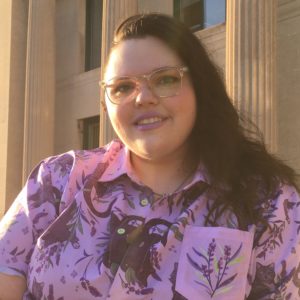 This post was written by Holly Fitzpatrick, who was selected to be one of this year’s DLF Forum Community Journalists.
This post was written by Holly Fitzpatrick, who was selected to be one of this year’s DLF Forum Community Journalists.
Holly is a recent graduate of the MLIS program at IUPUI, with a specialization in Archives Management. They have worked in libraries for ten years, most recently as a Special Collections Intern for the Indianapolis Public Library, where they arrange, describe, and plan programs in collaboration with collection donors. Holly is also a member of the SAA’s Accessibility & Disability Section Mentoring Cohort, working to improve accessibility for disabled patrons as well as advocating for disability accommodations for archival employees. Holly’s career goal is to make records of LGBTQ+ histories widely available and free for public use, with a focus on community outreach and digital preservation.
The Archive as a Tool for Accountability
During the 2021 DLF Forum, I focused on exploring the program category of “Access, Accountability, Action” to learn more about how archives are providing space and structuring organizational goals around corporate, governmental, and institutional accountability applicable both to the historical record and to today’s world.
In LIS circles, we are often asked to incorporate collection materials, institutional policies, programming, literature, and more that represent all sides of complex topics; citing key documents including the ALA “Freedom to Read Statement” (2004) in response to library workers’ concerns, like when racist and transphobic hate groups host public events in library spaces. By standing in solidarity with library workers whose institutions prioritized dangerous hate speech over their own employees’ safety, and by calling for accountability and institutional change within said organizations, my politics around library neutrality shifted such that I now believe it is the library’s responsibility to address vital topics like power dynamics, historical context, and reparations in everything we do; both in internal conversations and public-facing interactions. For instance, it is simply not enough when we, the ones responsible for cataloging history and ensuring its accessibility, make a land recognition statement without connecting it to current events and including a call to action: even when well-intentioned, such statements divorced from the larger context can ring hollow and appear disingenuous to the people libraries, archives, museums, government bodies, and academia have traditionally harmed and in many cases, continue to harm.
Kate Tasker’s presentation “Digital Archives Save Lives: Preserving Documents for Public Health” detailed the collaboration between UCSF and Johns Hopkins in creating the Opioid Industry Documents Archive. Built from the foundation of the Truth Tobacco Industry Documents, it contains records released following litigation with corporate bodies implicated in the estimated 500,000 deaths attributed to the opioid epidemic. Highlights from the collection include targeted marketing strategies to promote opioids to elementary children in sports, veterans, impoverished people, and those with chronic pain while pharma executives blatantly lied about their products’ potential for abuse, tolerance, and addiction. The Opioid Industry Documents Archive does an excellent job of adding context to the documents they curate and preserve, stating the harm that the opioid industry has perpetuated and the importance of their publicly-accessible, digital collection in mitigating further potential for harm from the same or similar corporate bodies. It does raise questions for me, however, in that doctors are necessary for opioid prescriptions: what is the role of Johns Hopkins itself, and the doctors who have trained there, in progressing and/or slowing the opioid epidemic?
Theodore Mallison and Cassandra Berman presented “Digitizing the Maryland Province Archives: Confronting Jesuit Slaveholding and Providing Access for Diverse Communities,” displaying their work to remove barriers in the accessibility of documents that detail Georgetown University’s role in Jesuit slaveholding. The bulk of the Maryland Province Archives on this topic focus on the 1838 sale of 272 enslaved people, which helped to bring the struggling university out of debt and cement it as an established academic institution. The Maryland Province Archives’ digitization of these documents goes a long way to make history accessible, especially for the descendants of people owned and sold by Georgetown in the early years of the institution. Still, I question the ability of an institution like Georgetown to make reparations at all: as a private university where today’s undergraduate students can expect to pay almost $30,000 tuition per semester without financial aid, how difficult is it for Black students to study in a place where their ancestors’ suffering was the foundation for the survival of the institution itself? Georgetown still has work to do on this matter, and not just from within the archive.
As archivists who work to record history and make it accessible for a digital audience, we have many interdisciplinary considerations ahead of us. We will not always get it right when it comes to accountability in the archive, which makes it all the more important we are open to stakeholder input, we consult with a diverse team over a number of years, and that we explore the records we hold of human suffering with a broad view of the long-term sociocultural, economic, and other impacts on people alive today. Places like the DLF Forum are not afraid to ask difficult questions about the records in our care, and I very much look forward to seeing where the Digital Library Federation itself goes as it continues to grow and provide space for these important conversations in our industry.
